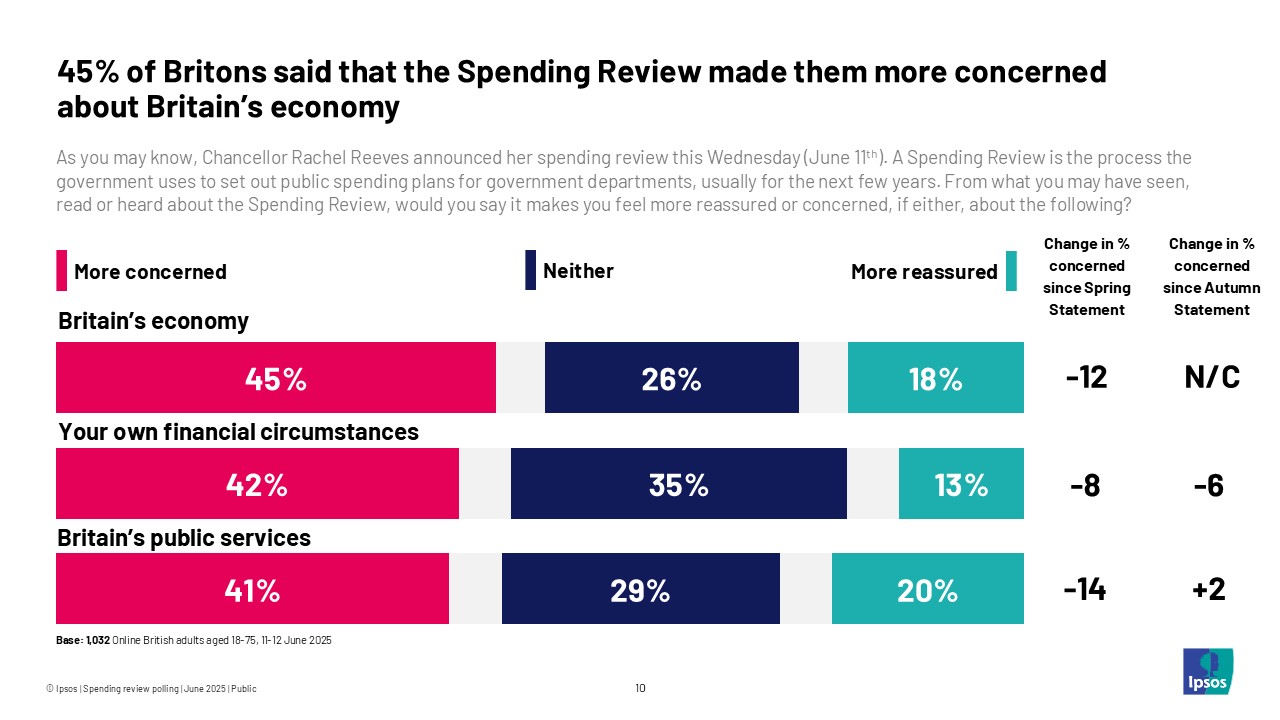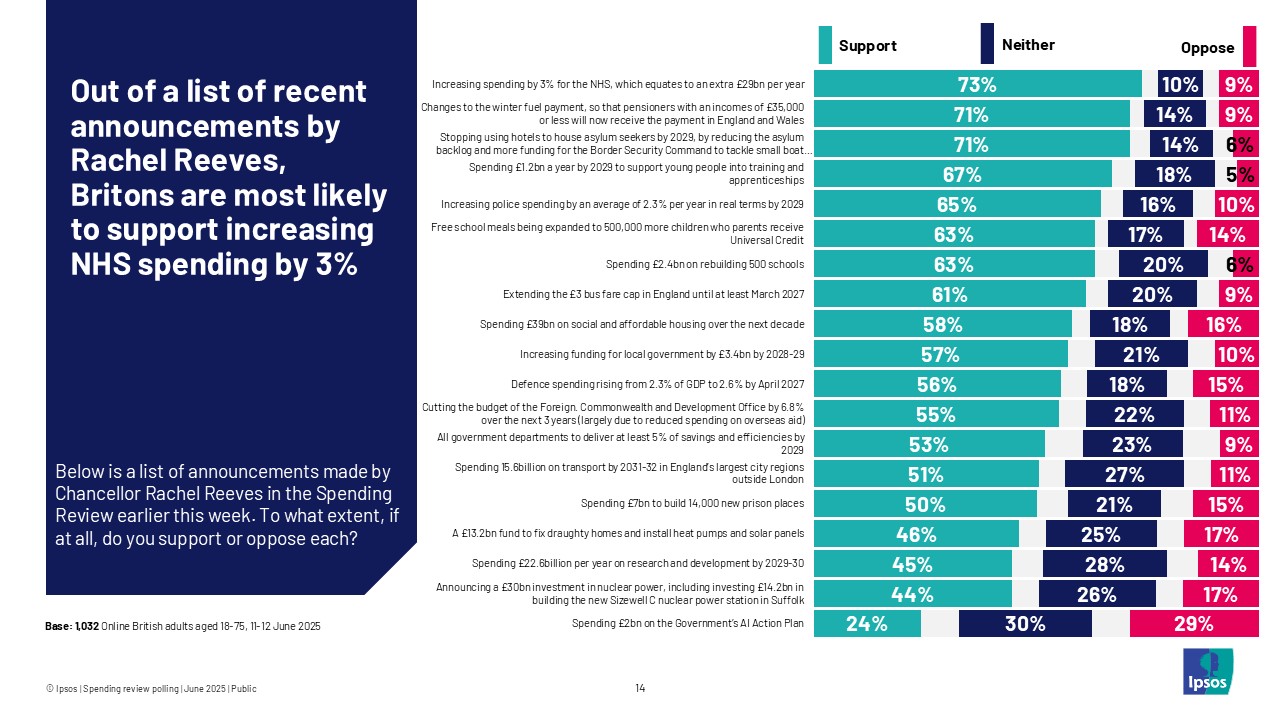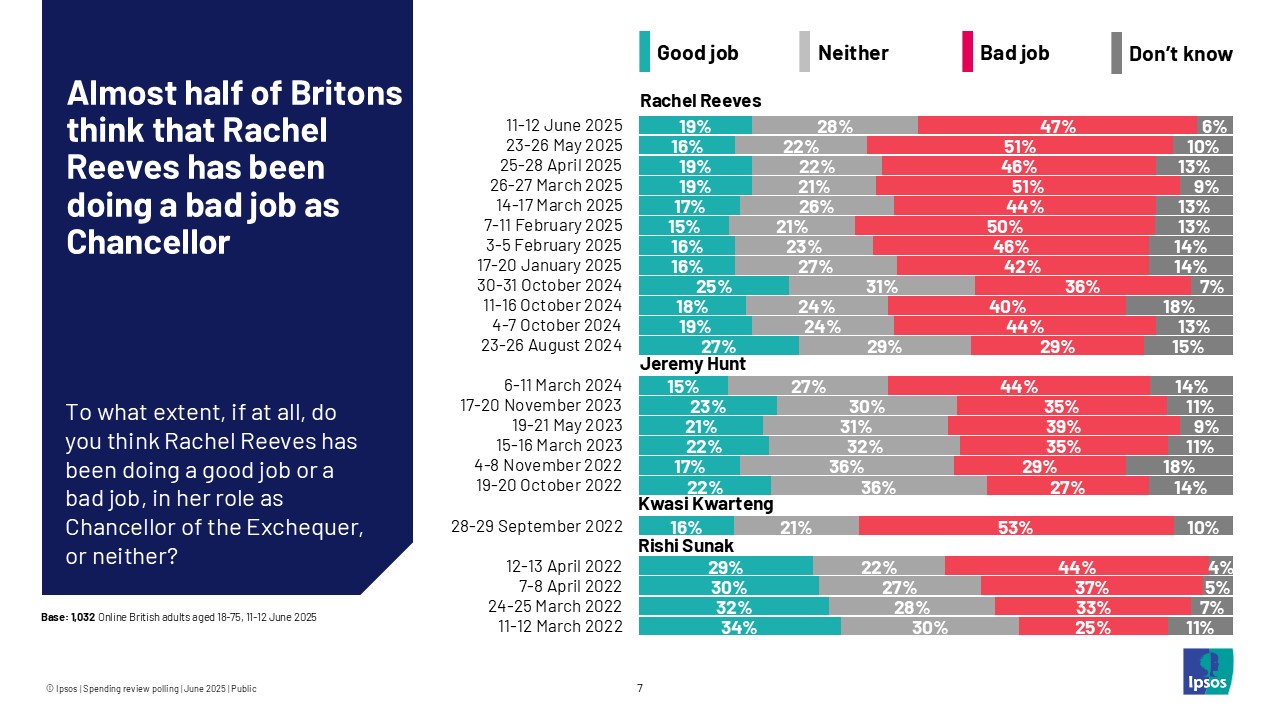8 in 10 Britons expect tax rises post-Spending Review despite support for individual announcements
New polling data from Ipsos in the UK reveals a mixed reaction from the British public immediately following the Chancellor’s Spending Review. The research, conducted online between June 11th-12th, 2025, among 1,032 British adults aged 18-75, finds that while individual policies within the review garner strong support, nearly eight in ten expect the taxes they personally pay to rise within the next year.
Few Britons feel more reassured about the economy or public services after the Spending Review, even as individual policies generate support
- Awareness of Spending Review measures: Two-thirds (66%) of Britons say that they have been following the Spending Review closely, compared with eight in ten (82%) following stories related to the rising cost of living closely. The announcement from the Spending Review period heard most was changes to the winter fuel payment, with over half (55%) saying it was the one they were most aware of. This is followed by the expansion of free school meals (40%), increases to NHS spending, and stopping the use of hotels to house asylum seekers (both 39%).
- More concern than reassurance: 45% of Britons say the Spending Review made them feel more concerned about Britain’s economy. Similar levels of concern were noted for Britain’s public services (41%) and personal financial circumstances (42%). However, there is not as much negative reaction to the Spending Review as after the Spring Statement earlier this year, with the percentage of those left more concerned about the economy now 12 ppts lower.

- Support for NHS spending: Out of a list of announcements made by Rachel Reeves during and in the run-up to the Spending Review, increasing spending for the NHS garners the most public support (73%). This is followed by changes to the winter fuel payment and stopping the use of hotels to house asylum seekers (both 71%).

- Tax hike expectations: A large majority (78%) think it is likely that the Labour party will increase the taxes that they personally pay over the next year, up slightly from 72% last month.
- Spending on public services vs. cutting taxes and borrowing: Britons are slightly more likely to think that the government is too focused on increasing spending on public services/ benefits (34%) instead of cutting taxes and borrowing (26%). This perception is highest among Conservative (58%) and Reform UK (47%) voters.
Economic gloom persists
- Labour gains trust on the economy: Following the Spending Review, Labour has seen a slight increase as most trusted by the public to manage the economy (25%, a 5 ppt increase since May 2025). They also continue to be the most trusted party to improve public services (27%, up 2 ppts since last month).
- …but most still think the economy is in a poor state: Nearly three in four (73%) Britons believe the British economy is in a poor state, with only 24% viewing it as good. This is identical to figures before the Spending Review.
- Public services continue to be a mixed bag: Perceptions of local public services are more split, with 49% describing them as good and 47% as poor. These figures are consistent with polling earlier in the year. However, 47% believe that the UK is currently experiencing austerity (26% disagree). Attitudes to austerity varied only slightly depending on whether people were told all the Spending Review announcements first. Among the half of the sample who were told the Spending Review announcements first, 45% believed that the UK is in austerity, while among those who were asked the question before being informed of the announcements, 50% believed that the UK is in austerity.
- Reeves' performance continues to be under scrutiny: Almost half (47%) of Britons think Rachel Reeves is doing a bad job as Chancellor of the Exchequer, down slightly from 51% in May. Around two in ten (19%) think she is doing a good job, up slightly from 16% in May.

- Perceptions of government treatment: Over half (56%) of Britons believe pensioners are treated worse than they should be by the British government. 54% each also think that farmers, working people more generally, and small businesses are treated worse than they should be. Conversely, 54% say that people on high incomes are treated better than they should be.
Commenting on the findings, Gideon Skinner, Senior Director of UK Politics at Ipsos, said:
The immediate response to the Spending Review demonstrates the long-term challenges facing the government. Labour’s attempts to address public priorities on the NHS, winter fuel, asylum, and other frontline public services are broadly welcomed in and of themselves, and Keir Starmer and Rachel Reeves’ party continues to be most trusted – just – on the economy and public services. But reassuring the public’s deeper concerns over the state of the economy, public services, and their standard of living will take more than a series of individual policy announcements, regardless of their popularity. There has been entrenched public pessimism for some years now, with little sign Britons feel they have got the change they were hoping for after the election, and our polling shows the Spending Review has not been able to turn around that tanker – the public are looking for tangible improvements in their daily lives, which they don’t think Labour has yet delivered. Strikingly, our polling also shows that nearly 8 in 10 believe tax rises are likely, reflecting widespread concern over the cost of living, and a public split down the middle on tax cuts vs spending. Despite the Chancellor looking to change the narrative to one of renewal, these questions continue to persist.
Technical note:
- Ipsos interviewed 1,032 online British adults aged 1 8-75 from the 11th-12th June 2025.
- Data are weighted to match the profile of the population. All polls are subject to a wide range of potential sources of error.




